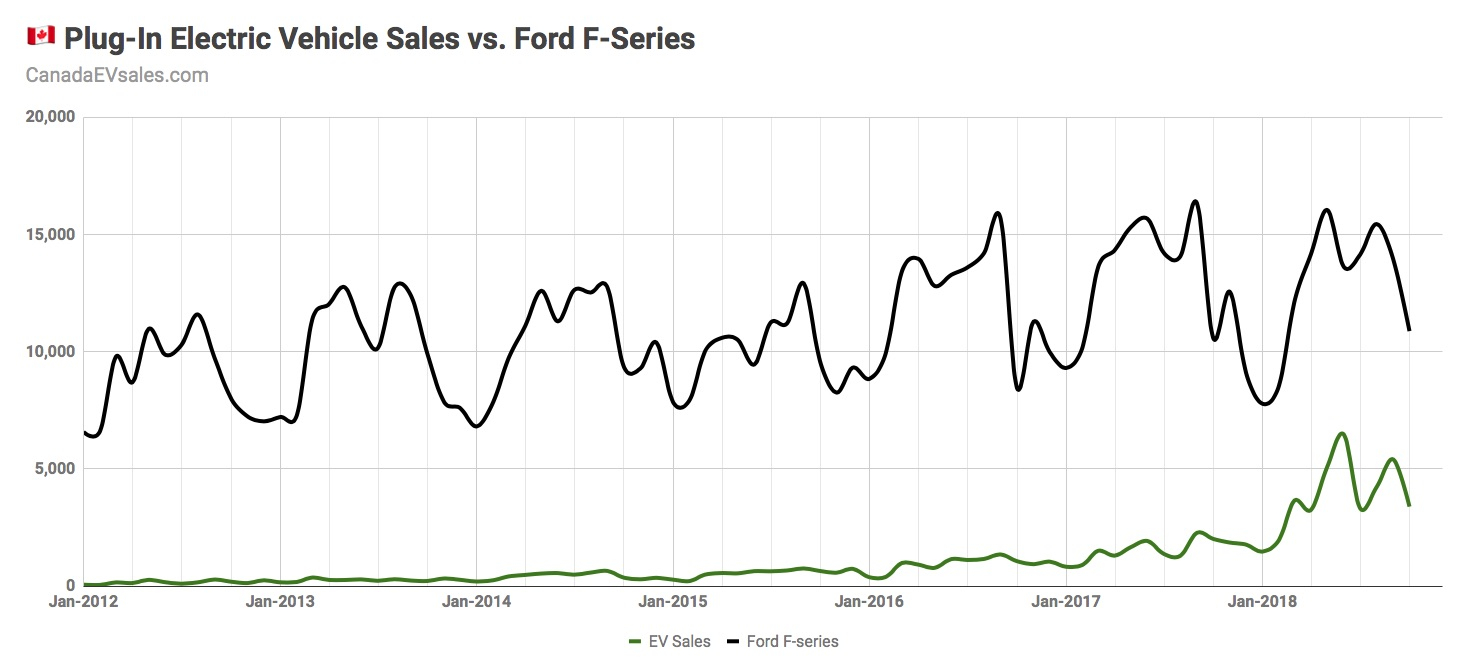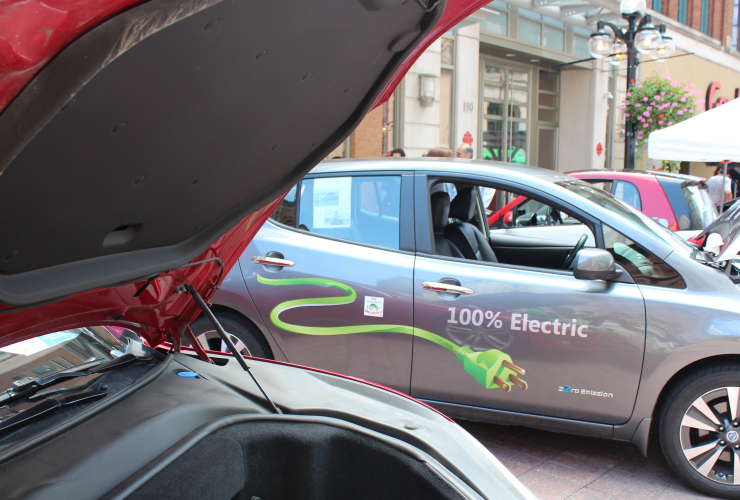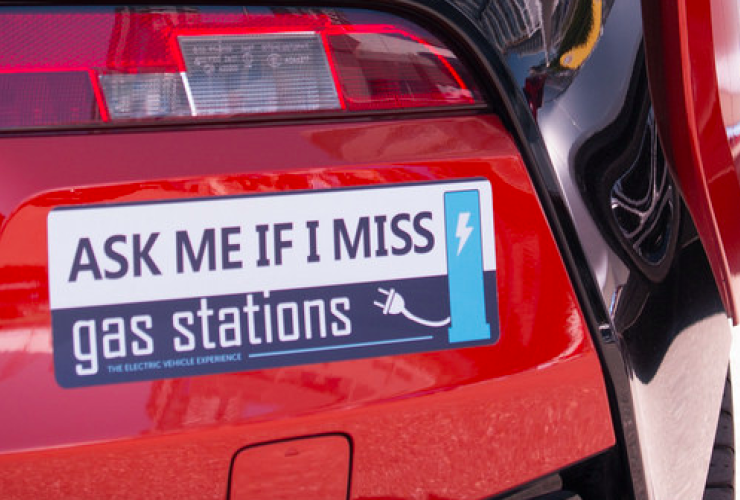For the past several years, Canada has lagged the United States in carbon cuts and plug-in electric vehicle market share. America looks poised to continue beating Canada on emissions cuts but on EVs, 2018 may be our breakout year.
At the end of October, Canadian plug-in EV sales broke through the symbolic threshold of two per cent of new cars sold (2.2 per cent), more than doubling the 0.9 per cent in 2017.

Canadian EV sales compared to U.S.
Canadian EV sales have not only passed the two per cent threshold but have nudged ahead of the United States where EVs have 1.9 per cent market share in 2018 to date.

Top Selling EVs in Canada
The Nissan Leaf and Tesla Model 3 are jockeying to be Canada’s top-selling plug-in electric vehicle this year, both having registered more than 5,000 sales. (While these are unprecedented figures for the nascent product category, readers should keep in mind that there’s a long road ahead: Ford sold 10,874 F-series trucks in October alone.)
The Mitsubishi Outlander plug-in hybrid will likely finish the year in third place. Through October its sales stood at about 4,750. The Chevy Volt (about 3,800 year-to-date sales) and Prius Prime plug-in hybrids (about 3,100) and the Chevy Bolt battery electric vehicle (roughly 2,100) round out Canada’s “Big 6” plug-in EV models. Together they account for about two-thirds of the 38,000 plug-in electric vehicles sold across Canada this year.

Incentive policies
Americans enjoy a federal income tax credit of up to $7,500 ($10,000 Canadian) when they lease or purchase plug-in electric vehicles, with some states offering further incentives. This makes them more affordable, boosting sales. (The author analysed the impact on EV sales when British Columbia’s purchase incentives were allowed to expire in 2014, then were brought back in 2015. Recent data also suggests that contrary to stereotype, Canada’s Tesla buyers have also become price-sensitive.)
Zero Emission Vehicle Mandates
California’s Zero Emission Vehicle, or “ZEV mandate” is widely held to be the main driver for plug-in electric vehicle sales south of the border. It requires that an increasing percentage of automakers’ sales come in the form of zero-emission vehicles.
Historically, automakers have been as receptive to ZEV mandates as McDonald’s might be to a “salad mandate.” While colourful theories abound, the mundane reality is that they fear consumer demand will one day lag legislated requirements. Although electric vehicles do require less maintenance than combustion vehicles (well, most of them), reliable cars make for repeat customers, and every carmaker would love a piece of Toyota’s quality cachet. The main barriers at the dealership level are obtaining adequate supply, the financial risk of providing additional training for high-turnover sales staff, and the fact that it can take four times longer to sell plug-in electric vehicles than their combustion cousins.
To the surprise of many, GM recently proposed a federal ZEV mandate in the United States. The Union of Concerned Scientists has suggested this was a savvy attempt to eliminate fleet fuel efficiency standards — allowing the automaker to sell ever more fuel-thirsty SUVs and trucks.
In Canada, Quebec was the first province to implement a ZEV mandate which came into effect in January 2018. British Columbia is expected to announce its own soon, as part of the government’s Clean Growth Strategy. Quebec’s law is patterned on California’s, and has already had an impact; la belle province gets first dibs on Canada-bound plug-in electric vehicles, to the detriment of would-be EV buyers in other parts of the country.
As with any legislation, the devil is in the details. While automakers must earn ZEV credits equivalent to 22 per cent of their provincial sales in 2025, zero-emission vehicles can earn up to 4 credits apiece, meaning that Quebec’s targets could be reached with a plug-in electric vehicle market share as low as 5.5 per cent. That’s hardly a stretch — through September (the most recent month for which vehicle registration data is available) Quebec’s plug-in electric vehicle market share was 3.3 per cent. British Columbia’s was 3.7 per cent. B.C.’s provincial government has stated its intent to maintain purchase rebates at current levels until they represent 5 per cent of new car sales, in addition to the rumoured upcoming ZEV mandate.
'Talking Transit'
Zero emission vehicles are expected to displace combustion vehicles much more quickly in fleets of heavy-duty vehicles — vans, buses, trucks — than in passenger vehicles. To that end, an upcoming seminar / webinar from Simon Fraser University’s Renewable Cities program might be of interest to National Observer readers. Representatives from TransLink and King County Metro Transit in Washington state will be discussing their plans and lessons learned for electrifying their fleets.
A note on taxonomy: As the name suggests, “plug-in electric vehicles” are vehicles whose batteries can be plugged in to external power. The category includes battery-electric vehicles such as the Nissan Leaf or the various Tesla models, but also plug-in hybrid vehicles (PHEVs) such as the Chevy Volt or the Mitsubishi Outlander PHEV. These have smaller batteries and a full gasoline system that can be used for longer-distance daily travel, or road trips. Conventional hybrids such as the ubiquitous Prius taxis are not plug-in electric vehicles (though Toyota manufactures a plug-in hybrid version of the Prius, called the Prius Prime).
If you’ve made it this far, you must care about in-depth and responsible journalism. How about supporting more articles like this one. Get 60% off during our Black Friday sale (only $55.99, reg. $139.99) for access to Canada’s top investigations on energy, climate, the environment and more. If you’re already a subscriber, please consider gifting a subscription, just in time for the holiday season.
Totally ignoring Doug Ford's
Totally ignoring Doug Ford's cancellation of the EV rebate in Ontario???
Informative article with lots
Informative article with lots of in-depth coverage and links. Very useful. Thanks.




Comments